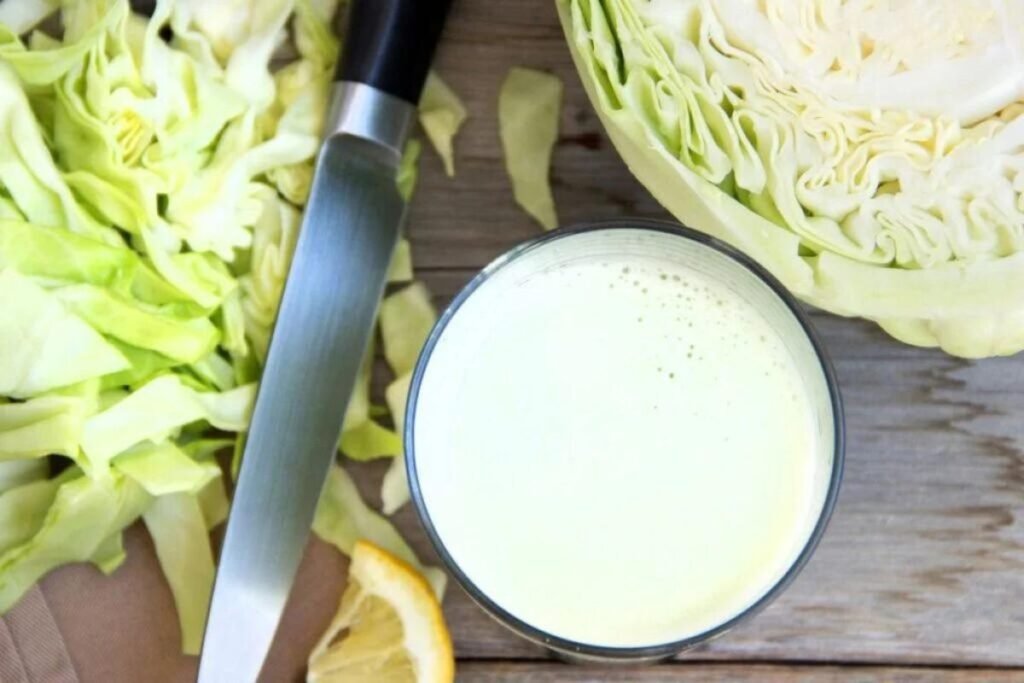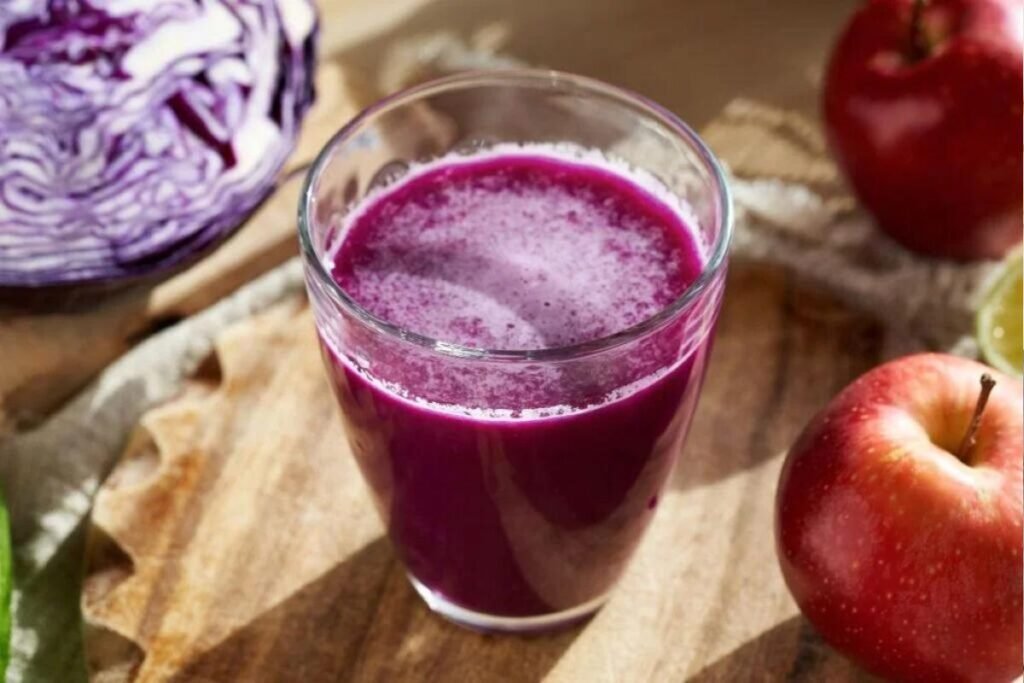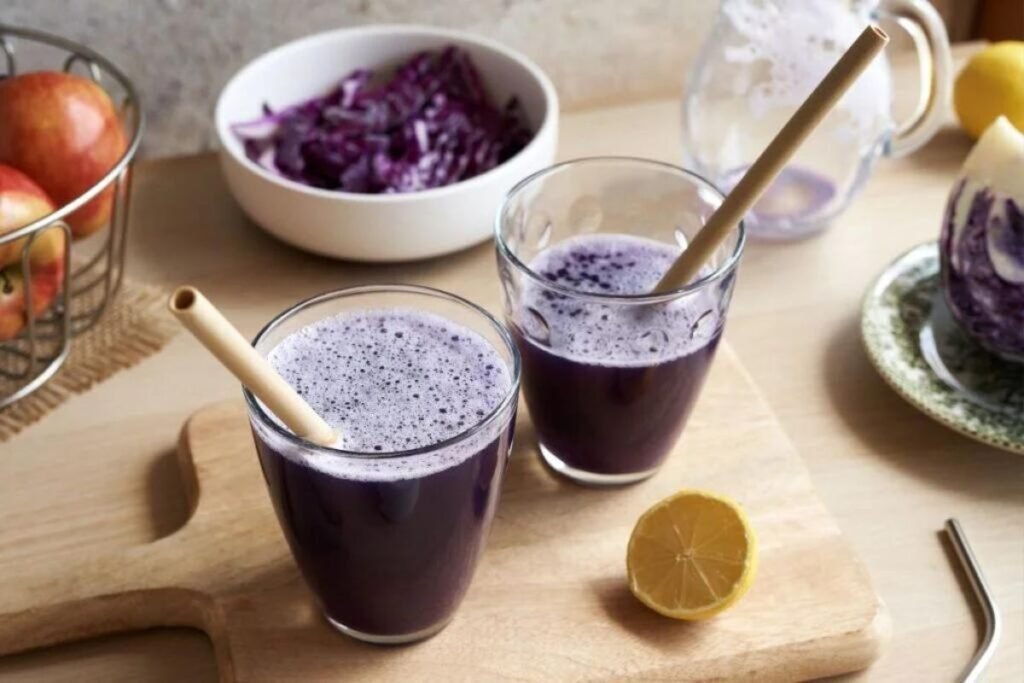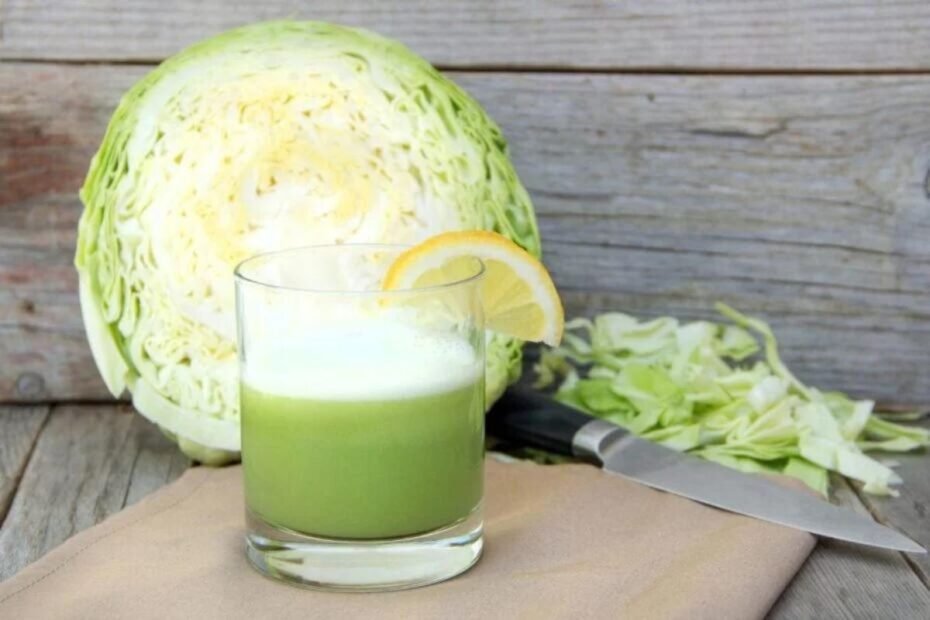Cabbage juice is an excellent way to add nutrients and vitamins to your diet. Cabbage is a cruciferous vegetable that is low in calories but high in fiber, vitamin C, and other antioxidants. We will share the benefits of white and red cabbage drinks. Also, we provide a recipe for making this drink healthy and tasty.
Vitamins and Minerals in Cabbage Juice
Cabbage juice is a source of vitamins and minerals essential for optimal body function. It has vitamins A, B1, B2, B6, E, C, and K, folic acid, iron, iodine, sulfur, phosphorus, and potassium. Vitamin K plays a vital role in blood clotting and bone health, while vitamin C strengthens the immune system, promotes collagen production, and maintains a well-balanced skin condition. B vitamins help with energy production, and potassium helps regulate blood pressure.
Benefits of Cabbage Juice
Although the production of juice removes most of the fiber, the other nutrients in cabbage are concentrated and more easily absorbed. Cabbage juice is an excellent way to absorb all the beneficial substances in the body.

- Reducing inflammation. Taking cabbage drinks helps the body fight inflammatory reactions. The nutrients convert into sulforaphane, which the body uses to fight inflammation and carcinogenic substances (such as colon and breast cancer.)
- Maintaining hormone balance. The juice balances the body’s estrogen levels, responsible for the female reproductive system. This is the reason to drink cabbage juice and not exceed large quantities of fresh cabbage.
- Antioxidant properties. Cabbage juice is rich in antioxidants, particularly vitamin C. Body uses these substances to repair damaged cells, protect against free radical damage, and strengthen the immune system. Red cabbage juice is rich in anthocyanins, the plant pigments that give red cabbage its deep purple color. These substances have strong antioxidant properties and have been shown to reduce the risk of heart disease.
- Blood pressure regulation. The potassium helps to relax blood vessels and improve blood flow, reducing the strain on the cardiovascular system. Including cabbage juice in your diet can help to maintain proper blood pressure levels.
- Maintaining skin. Various toxins and impurities affect the skin, one of the body’s largest organs. Cabbage juice contains sulfur compounds that naturally help to remove toxins from the skin, leaving it healthy and radiant. Vitamins A and E help fight free radicals and protect against cellular damage, which can delay the signs of aging. Regular use also helps reduce inflammation, acne, and other skin conditions.

The Juice for Bowel Function and Ulcer Treatment
Cabbage juice is highly valuable for those with stomach problems or ulcers. This juice balances the stomach acidity and reduces the risk of stomach ulcers. Thanks to the sulforaphane and other natural enzymes in cabbage juice!
The amino acid methionine in the juice protects the stomach against acid erosion and damage to the gastrointestinal mucosa, and the calcium in cabbage juice speeds up the healing process by allowing clots to form quickly. Vitamin K, also present in the juice, helps control bleeding.
Studies show that drinking 1 cup of cabbage juice 3-4 times a day can reduce stomach ulcers in less than two weeks. The substances in cabbage juice also stimulate intestinal peristalsis, improving digestion and reducing the risk of constipation.

Possible Side Effects of Cabbage Juice
Although cabbage juice has health benefits, there are some possible side effects.
Consuming large amounts of cabbage juice can lead to thyroid problems. Studies show that excessive consumption of cruciferous vegetables can affect the thyroid gland and increase the risk of cancer. In addition, green cabbage contains higher levels of goitrogens, so people suffering from thyroid diseases such as hypothyroidism should consult their doctor.
Some nutrients in this juice may interact negatively with medicines. Vitamin K in cabbage may affect the clotting-preventing properties of blood thinners (e.g. warfarin). It is best to avoid cabbage juice if you are taking blood thinners.
Squeezing the juice from the cabbage removes much of the fiber. Fiber promotes satiety, supports proper bowel function, helps to regulate blood sugar levels, and can lower cholesterol. Therefore, consuming the juice does not provide sufficient fiber and can disrupt these body systems.
Some people may experience intestinal disturbances when drinking cabbage juice. This juice is rich in fructans, carbohydrates that are often difficult to digest in people with irritable bowel syndrome (IBS). Even when consuming small amounts, people with irritable bowel syndrome may experience symptoms such as bloating, abdominal pain, and diarrhea.
How to Make Cabbage Juice?
You can easily make cabbage juice at home. Try to add extra fruit, vegetables, or spices because this drink has a weak taste. Red cabbage tends to be slightly sweeter, making it a better choice if you plan to mix the juice with other fruits. Make the cabbage juice using the solid core of the cabbage head, but go ahead also to add a few outer leaves.
To make cabbage juice, you need:
- medium-sized cabbage
- 200 ml of filtered water
- 0,5 apple
- 1 lemon
- 3 cm fresh ginger root
Preparation:
- Finely chop the cabbage.
- Peel the lemon, peel the apple, remove the seeds, then chop the fruit.
- Cleanly shave the ginger root and chop it.
- Place all the ingredients in a food processor and puree for 2-3 minutes until you have a smooth paste.
- Place a cheesecloth on a food container, and squeeze the cabbage mixture through it.
- Serve the resulting juice chilled.

Tips
- If you have a juicer, you can squeeze the juice in there. In this case, you don’t need to use the cloth.
- Drink the juice immediately. It is best to drink the cabbage juice within 30 minutes. Otherwise, the oxidation process results a rapid loss of juice’s nutritional value. Oxidation can break down the enzymes, vitamins, and other beneficial compounds, making juice less effective and changing its taste. If you can’t drink the juice straight away, store it in a glass leak-proof bottle in the refrigerator for up to 24 hours.
- Experts recommend drinking a cabbage beverage in the morning before a meal to absorb all the benefits more quickly. It is also preferable to drink it at least 30 minutes before or two hours after a meal.
- You can also mix other fruits or vegetables with cabbage, such as carrots, celery, cucumber, pineapple, lemons, oranges, and mint leaves.
Sources:
- https://www.organicfacts.net/cabbage-juice.html
- https://shazaiherbalhaven.shop/amazing-benefits-of-cabbage-juice-the-new-health-tonic/
- https://ourplantbasedworld.com/benefits-juicing-cabbage-recipe/
- https://www.medicalnewstoday.com/articles/cabbage-juice-for-ulcers
Associative photos from © Canva.
